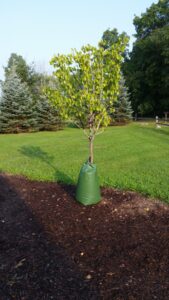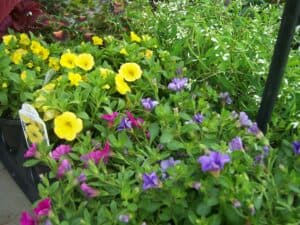By Jennifer Fairfield, owner the Garden Mill
(Publisher’s note: Part 1 of this column published yesterday.)
In the flower garden:
Much like in the veggie garden, keeping insects under control this month is often challenging, though I haven’t seen too many of my usual nemeses so far. I have seen aphids on a number of my plants, and just saw my first Japanese beetles of the season yesterday.
Other plant-munching beetles, and one of my least favorite pests – sawfly larva – have yet to make an appearance, but I’m sure it’s just a matter of time. I tend to rely on either Insecticidal Soap, Neem Oil, or Spinosad (in the form of Captain Jack’s Dead Bug Brew) for the aphids, milkweed beetles, and sawfly larva, but the best way to deal with Japanese beetles is to simply pluck or shake them off the plants into a bucket of soapy water. The soap coats their wings, making it impossible for them to get out of the water, and they eventually drown. The best time of day to do this is in the afternoon, when it has warmed up, and they are most active.
Getting as many as you see on a daily basis will help keep them under control. If you wait too long, the few you have will suddenly turn into a mob, as they don’t like to dine alone, and once one has found your garden, it will send out signals to all its friends to come and join it. Squashing them also sends out a message to their friends, who then show up in droves to avenge their buddy, so dunking is really the best answer. Don’t fall for those bags that trap the beetles, either. All those do is attract more of them to your yard.
Be sure to fertilize roses throughout the month, but stop fertilizing at the end of the month to allow new growth to harden off before winter. Remove diseased leaves immediately and pick up any that have fallen to help prevent the spread of disease. Aphids and mites can be major rose pests, and can cause serious damage if not kept under control.
Careful spraying (again, Neem Oil and Spinosad are effective here) when these pests are spotted is generally all that is necessary. These tasks, along with regular fungicide spraying to keep diseases such as powdery mildew under control, will help keep your roses healthy.
As in your vegetable garden, keep weeds under control in the flower garden, so they don’t compete with your flowers for moisture and nutrients. One option for controlling weeds in areas where you don’t have to worry about harming plants you want (think sidewalks, driveways, etc.) is Bonide® Burnout Formula II. This non-specific weed killer will kill almost anything it comes in contact with, so you want to be careful not to spray when it’s windy, or too close to plants you don’t want to get rid of. It has become my favorite, organic way to control weeds around my house.
Cut back perennials when they have finished blooming over the summer to help them concentrate on putting down new roots before winter. This will give you more lush plants next year.
To keep your potted annual flowers looking great all summer long, be sure to fertilize them. With frequent watering, fertilizer tends to get flushed out of the container, so regular feedings are a must. Also, don’t forget to deadhead. By removing dead flowers, you encourage the growth of new ones throughout the season.
And don’t forget to water. Container plants are often placed in areas where what rain we might get doesn’t reach them, and they dry out much more quickly than plants in the ground, so be sure to water them frequently – as much as every day, when it’s hot and sunny.

Trees & Shrubs:
Regularly water any trees and shrubs planted in the past couple of years. With the extended dry period that we had earlier, we are still not caught up on where we should be at this point for ground water, and newly planted trees and shrubs don’t yet have the established root systems needed to efficiently pull water from the soil.
The term “newly planted” applies to the first three years after you have put in new trees and shrubs – that’s how long it takes to get their roots established, in good times. When we are experiencing drought conditions, you should water trees and shrubs that were planted even longer ago, as going for long periods without water can severely stress them.
Tree watering bags can be a life-saver (literally for your trees, and figuratively for you) during extended dry periods like we had this spring. You only have to fill them up once or twice per week, and they slowly water your trees for you. If you only have a couple of trees or shrubs to water, soaker rings are another really great option. Hook a hose up to them and just let them do the watering for you.
If you need to fertilizer your trees or shrubs, don’t apply fertilizer after the 4th of July, to avoid a flush of new growth that doesn’t have time to harden before winter. Newly planted trees and shrubs should not be fertilized for the first two to three years after planting. Fertilizing encourages foliage and stem growth, and you really want your trees and shrubs concentrating on root growth for the first couple of years.
Finish up pruning of trees and shrubs this month or early next. Pruning too late in the season can encourage new growth that will not have time to harden off before winter sets in. And remember that you should never prune oak trees outside of the depths of winter, in order to avoid the devastating disease of oak wilt. If your oak trees sustain damage, such as due to strong winds or storms, it’s important to prune back damaged branches quickly and then immediately seal the wounds with latex paint to keep seeping sap from attracting disease-carrying beetles.
Lawn:
The good thing about the lack of rain this spring is that we haven’t had to mow as much as usual. When you are mowing this summer, leave your grass between 3 and 4 inches tall, and only cut off the top third of the blades at each mowing. Keeping your grass a little higher will help it retain moisture during the hot, dry summer we are likely to have, and will help suppress weeds.
You’ve probably noticed brown areas in your lawn this spring, unless you’ve been irrigating. Not to worry – those brown, dead-looking areas are most likely dormant – not dead – because of the lack of rain. With the rain we recently saw, I’m seeing those brown patches turn back to green in my lawn, but I expect to see the brown appear again, if we don’t see regular rain.
Unless we really get into prolonged drought conditions, watering your lawn shouldn’t be necessary to keep it alive. It’s natural for the types of grass that grow in Michigan to go dormant when it dries up for a while.
Another good thing about the dry conditions is that it makes it harder for Japanese beetles and their grubs. The grubs (larva of the beetles) don’t survive well when the soil is dry, and the eggs laid by adults can’t hatch in dry soil. So if the dry conditions continue, we may have a lower Japanese beetle population this year and next.
If you have been irrigating your lawn, you may be experiencing more of a problem with Japanese beetles, and therefore may also have more of an issue with grubs later in the season. Milky Spore is a good long-term solution for keeping grubs under control.
For the Birds:
Keep your birdbaths full, and consider putting out additional baths or even filling things like overturned trash can lids or large saucers with water for them. Dry conditions are as difficult on birds as on our gardens, and they are going to be looking for water wherever they can find it.
One place they may try to relieve their thirst is in your garden – by sucking out the juice of your crops. Making sure they have a consistent source of water may save your harvest. Just be sure to dump the water and refill it every day, to discourage mosquitoes from laying eggs.
Bees and butterflies would also appreciate some watering spots in your yard. You can provide water for them in shallow containers (planter saucers work perfectly for this). Fill the container with pebbles, rocks, or marbles and then fill with water to just below the surface of the pebbles. The pebbles or marbles give the bees and butterflies a place to land and safely sip. Be sure to change the water regularly, and be very careful about keeping pesticides away from your watering station.
The National Wildlife Federation has some great tips for providing water for butterflies.
Keep hummingbird feeders cleaned out and filled. Sugar water left out in the heat for a number of days can breed bacteria that is harmful to the beautiful birds visiting your feeders, so be sure to clean them out every few days.


















